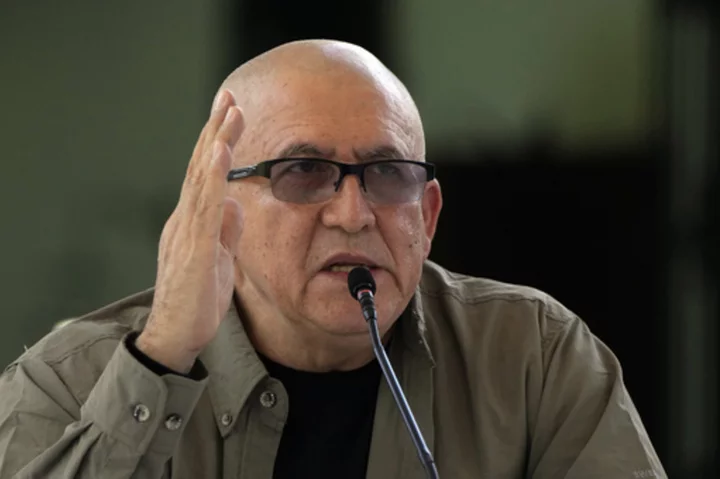WASHINGTON (AP) — Increasingly desperate Republicans convened behind closed doors again Friday as the endless search for a House speaker drags deeper into a second week leaving the GOP majority spiraling into chaos for the foreseeable future.
Attention swiftly turned to Rep. Jim Jordan, the hardline Judiciary Committee chairman and founder of the hardline Freedom Caucus as the next potential candidate after Majority Leader Steve Scalise abruptly ended his bid when it became clear hardline holdouts refused to back him.
But not all Republicans want to see Jordan as speaker, second in line to the presidency. Overwhelmed and exhausted, anxious GOP lawmakers worry their House majority is being frittered away to countless rounds of infighting over rules, personalities and direction of the GOP.
"Someone said 'You know, you could put Jesus Christ up for Speaker of the House, and he still wouldn’t get 217,” said Rep. Mark Alford, R-Mo., about the number needed to win a floor vote.
Next steps are uncertain as the House is essentially closed while the Republican majority tries to elect a speaker after ousting Kevin McCarthy from the job.
Jordan and his backers instantly revived calls for party members to get behind the Ohio Republican.
Backed by Donald Trump, the Republican frontrunner to challenge Joe Biden in 2024, Jordan had nominally dropped out of the race he initially lost to Scalise, 113-99, during internal balloting at the start of the week.
“Make him the speaker. Do it tonight,” said Rep. Jim Banks, R-Ind. “He’s the only one who can unite our party.”
Jordan also received an important nod Friday from the Republican party's campaign chairman, Rep. Richard Hudson, R-N.C., who made an attempt to unify the fighting factions.
“Removing Speaker Kevin McCarthy was a mistake,” Hudson wrote on social media, saying the party finds itself at a crossroads also blocking Scalise. “We must unite around one leader.”
Heading into the morning meeting, Jordan said: “I feel real good.”
But the firebrand Jordan has a long list of detractors who started making their opposition known. Other potential speaker choices were also being floated.
Some Republicans proposed simply giving Rep. Patrick McHenry, R-N.C., who was appointed interim speaker pro tempore, greater authority to lead the House for some time.
With the House narrowly split 221-212, with two vacancies, any nominee can lose just a few Republicans before they fail to reach the 217 majority needed in the face of opposition from Democrats who will most certainly back their own leader, New York Rep. Hakeem Jeffries. Absences heading into the weekend could lower the majority threshold needed.
In announcing his decision to withdraw from the nomination, Scalise said late Thursday the Republican majority still has to come together and “open up the House again. But clearly not everybody is there.”
Asked if he would throw his support behind Jordan, Scalise said, “It’s got to be people that aren’t doing it for themselves and their own personal interest.”
Scalise had been laboring to peel off more than 100 votes, mostly from those who backed Jordan. But many hard-liners taking their cues from Trump have dug in for a prolonged fight to replace McCarthy after his historic ouster from the job.
The hold-outs argued that as majority leader, Scalise was no better choice, that he should be focusing on his health as he battles cancer and that he was not the leader they would support. The House closed late in the night, with lawmakers vowing to meet again early Friday.
Handfuls of Republicans announced they were sticking with Jordan, McCarthy or someone other than Scalise — including Trump. The position as House speaker does not need to go to a member of Congress.
Trump, the front-runner for the 2024 GOP presidential nomination, repeatedly discussed Scalise’s health during a radio interview that aired Thursday.
“Well, I like Steve. I like both of them very much. But the problem, you know, Steve is a man that is in serious trouble, from the standpoint of his cancer,” Trump said on Fox News host Brian Kilmeade’s radio show.
Scalise has been diagnosed with a form of blood cancer known as multiple myeloma and is being treated, but has also said he was definitely up for the speaker's job.
McCarthy said afterward that Scalise would remain as majority leader but had no other advice for his colleagues. The California Republican had briefly floated a comeback bid but that seems uncertain.
“I just think the conference as a whole has to figure out their problems, solve it and select the leader,” he said.
The House is entering its second week without a speaker and is essentially unable to function during a time of turmoil in the U.S. and wars overseas. The political pressure increasingly is on Republicans to reverse course, reassert majority control and govern in Congress.
The situation is not fully different from the start of the year, when McCarthy faced a similar backlash from a different group of far-right holdouts who ultimately gave their votes to elect him speaker, then engineered his historic downfall.
But the math this time is even more daunting, and the problematic political dynamic only worsening.
Exasperated Democrats, who have been waiting for the Republican majority to recover from McCarthy’s ouster, urged them to figure it out.
“The House Democrats have continued to make clear that we are ready, willing and able to find a bipartisan path forward,” he said, including doing away with the rule that allows a single lawmaker to force a vote against the speaker. “But we need traditional Republicans to break from the extremists and partner with us.”
___
Associated Press writer Stephen Groves and Jill Colvin in New York contributed to this report.









